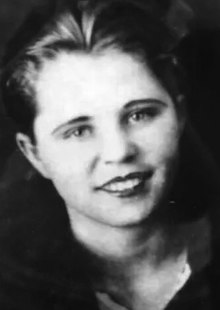Lyubov Shevtsova
Lyubov Grigorievna Shevtsova | |
|---|---|
| Любовь Григорьевна Шевцова | |
 | |
| Born | 24 September 1924 Izvaryne, Kransodon District, Ukraine SSR, Soviet Union |
| Died | 8 February 1943 (aged 18) |
| Awards | Hero of the Soviet Union Order of Lenin |
Lyubov Shevtsova (Template:Lang-ru; September 8, 1924 – February 9, 1943) was a Soviet partisan and a member of the Young Guard, an underground anti-Nazi organization in Krasnodon during World War II.
Early life
Shevtsova was born in Izvaryne, Krasnodon District in 24 September 1924 to a working-class Russian family. Her father had fought in the First World War and the Russian Civil War on the side of the Red Army; her mother worked at a field hospital as a nurse. Her family moved within the limits of Krasnodon city in 1927, where she graduated from seven grades of school before applying to a theater school in Rostov. However, the German invasion of the Soviet Union began shortly after she applied.[1][2]
Partisan activities
Shortly after the start of the war Shevtsova attended brief nursing classes and tried to enlist as a nurse in the Red Army, but was rejected for being too young at the time. So she joined the Komsomol in February 1942 and upon the recommendation of the Voroshilovgrad District Committee she began training to become a radio operator for the Young Guard in April. After completing the course and swearing an oath of allegiance she began transmitting information collected by the partisans to the Red Army Intelligence Center.[2][3]
She also participated in spreading leaflets, helped Soviet prisoners of war hide from the Germans, and participated in burning down the Labour Exchange building, which contained documents with the names of people that were to be deported and forced into hard labour for Germany. On January 8, 1943, Shevtsova was arrested as a wireless operator. The members of the Young Guard had been betrayed and all of them were arrested as well. The Gestapo tortured her to find out the transmission codes, apparently without success and shot her on February 9, at the age of 18 years.[2][3]
Recognition
On September 13, 1943, Shevtsova was posthumously declared a Hero of the Soviet Union. Young pioneer detachments, streets, and ships were named in her honor and memorials were dedicated to her memory.[1]
See also
References
- ^ a b Ufarkin, Nikolai. "Шевцова Любовь Григорьевна". www.warheroes.ru (in Russian). Retrieved 2018-05-04.
- ^ a b c Janina, Cottam (1998). Women in War and Resistance: Selected Biographies of Soviet Women Soldiers. Newburyport, MA: Focus Publishing/R. Pullins Co. ISBN 1585101605. OCLC 228063546.
- ^ a b "Сайт "Молодая Гвардия". Молодогвардеец Любовь Шевцова". www.molodguard.ru. Retrieved 2018-05-04.
- Heroes of the Soviet Union
- Soviet partisans in Ukraine
- Soviet military personnel killed in World War II
- Soviet women in World War II
- Resistance members killed by Nazi Germany
- Female resistance members of World War II
- 1924 births
- 1943 deaths
- People from Izvaryne
- Executed Soviet people from Ukraine
- Ukrainian people executed by Nazi Germany
- Executed Ukrainian women
- People executed by Germany by firearm
- Recipients of the Order of Lenin

